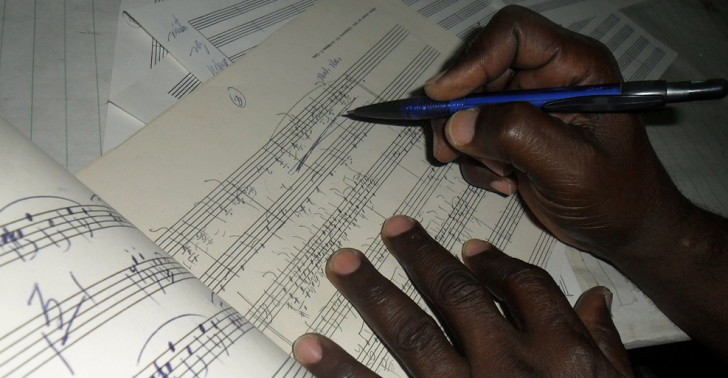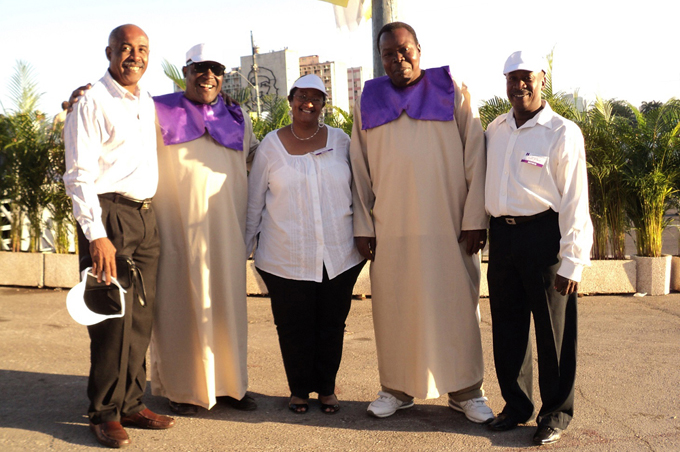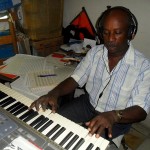
A Guantanamero in the papal Mass
When Conrado Monier did the musical arrangements and the orchestration of several themes for the Mass said by Pope Benedict XVI on José Martí Revolution Square in Havana on March 28, 2012, he was already renowned as the master he is in Cuba and other parts of the world.
An arranger, composer and genius of choral compositions, his music appears in the repertoires of hundreds of choirs worldwide, from Chile to the United States, Italy and Spain.
He is a prophet in Cuba. His hand is behind the Cubadisco awards, the Singing to the Sun children’s festivals, the concert bands, an innumerable list of CDs, and some of the true icons, like Compay Segundo, for whom he arranged tunes for his group and Italy’s Cittá Ferrara symphony orchestra.
He is also conductor and arranger for Sugerencia, a pop-music group whose name doesn’t stand out in the local scene but is worth watching for the excellence with which it performs Cuban genres, especially those by composers from Guantánamo.
Nonetheless, it is not everyday that a musician has the opportunity to arrange a Mass for the figure of someone as influential as the Pope.
Journey to Havana
Any conversation with Conrado Monier has to include pianist Carmen González, his wife of more than a decade and the historian of his work. She keeps track of the names, choirs, recordings, dates.
This story of a Guantanamero — an exceptional man, uniquely able to arrange music without mistakes, in record time — who becomes the arranger of a Mass dedicated to the leader of the Church of Rome began more than 40 years ago, Carmen says, when he met Alina Orraca.

Under her direction, the Choir of the National Arts School won second place at the 1979 Vienna Choir Competition with Monier’s arrangements of Cuban choral works.
Since then, many of the scores in the repertoire of the Scola Cantorum Coralina have borne his signature, so when Alina Orraca was asked to organize and direct a Mass, in cooperation with Cardinal Jaime Ortega y Alamino as she had done previously for John Paul II (“good arrangements that can be done quickly”), only one name came to her mind.
She phoned Monier the same day, asked him if he had ever arranged for a symphony orchestra, and the Guantanamero’s “yes” sealed the collaboration. Two days later, the arranger was in Havana, in a room that Alina prepared for him with everything he might need, so that “I won’t bother anyone when I get up to work, which could be at any time.”
In less than a week, the musician had delivered to the conductor the scores to four movements of a Mass by the late Cuban composer Alfredo Levy: the song “Lord, have mercy,” the guaracha/habanera “Holy,” the punto “Lamb of God” and “Glory,” a mixture of bolero, criolla, guajira and zapateo that eventually was left out of the Mass, which was performed almost on Easter Day.
In addition to Monier’s arrangements, the program included scores by Cuban composer and presbyter Jorge Catasús, Austrian-born Wolfgang Amadeus Mozart, Italian-born Gregorio Allegri, and French-born Cesar Frank.
“My job was to take Levy’s themes, written for two voices and piano, and arrange them for four voices and symphony orchestra,” says Monier. “Sometimes people get confused and say that the Cubanness of those scores was created by me. The Cubanness was already there; I only built on it.”
Conrado talks about this subject as serenely as you read this. He doesn’t believe in God but understands the importance of his work being included in the Mass, which he witnessed from the tent reserved for the press and other guests, without the devotion that moves thousands of Cubans during each papal visit.
That devotion will again move the Cuban people when the first Latin American pope in history will step on Cuban soil next September.
Conrado does believe in music, though. He says that music is like a military career. Each quarter note, each whole note has a value and the secret of being a good arranger, orchestrator, even performer, is not to violate that value. Add nothing, remove nothing, not even a little.
“That’s why I am extremely serious with music,” he says. “Write that down,” he asks — and I do.
While working on Levy’s Mass, he made at least three phone calls to Guantánamo to consult with his wife Carmen on the liturgy and the music. Carmen, the daughter of a Baptist preacher and a church choir singer, advised him on the history of the Mass and on the tone required by the performance, right in the middle of Lent.
That was the only pressure he felt at that time.
“It was the pressure of not making mistakes in the genre, the style, the era. Also, I had to work in liturgical and symphonic styles that were very different from the popular music that I create most of the time.”
And he made no mistakes. Someone said that he had never heard so much Cubanness played with so much reverence. Orlando Vistel, one of Monier’s most exacting critics, said that with those arrangements he had added one more stripe to the tiger.
Alina got what she wanted. “The songs were very well done,” she said. “The orchestrations, the work with the voices, excellent. And that’s how the Church and the government saw it. Conrado is a brilliant musician; he’s a complete musician. He knows a lot about Cuban music and knows how to transfer it to the choir. The movements he arranged had a religious text but were Cuban in nature. I never doubted that he would do it perfectly.”
Monier was left with the certainty of a job well done and some money that he used to buy a new hard disk for his computer and for other practical purchases. Believe it or not, choral arrangements are a hobby that most of the time feeds only his passion.
So far as we know, no recordings were made of the Mass into which Monier invested so much of his genius. Only the memory in the minds of the millions of us who that day enjoyed his music.



